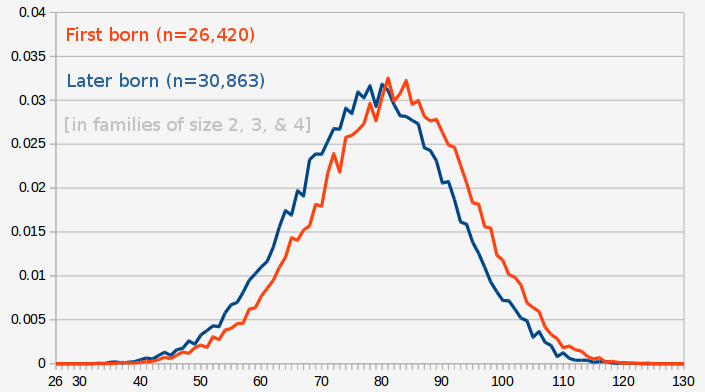Development of the Firstborn Personality Scale
This page documents the development of the Firstborn Personality Scale (FBPS v1.0). The interactive version can be found here.
Background
There have been frequent claims that the place of a child in the order of their siblings by birth has an effect on personality. Most of these claims have not held up to scrutiny. The largest studies have found that birth order effects are extremely small and limited in scope. Rohrer, Egloff, and Schmukle (2015) analyzed birth order effects on the big five personality traits and found a 0.1 SD difference between 1st and 2nd born children on the "Intellect" facet of the personality trait "Openness to Experience" and no differences on the other traits.
There is a puzzle here, because some other evidence suggests that birth order can have large practical effects. It seems the case that some groups, such as professors, have many more firstborns than would be expected by chance. The hardest numbers on something like this is that 71.4% of the readers of the blog SlateStarCodex from 2 child families were the first born. If you assume that becoming a reader of that blog is some function of an individual difference, a causal model will require a fairly large birth order effect on that individual difference, maybe 0.5 - 1 SD.
It is possible that birth order effects are not well captured by the questions and scales people have used thus far. To investigate this possibility, the development of a criterion-keyed scale which points directly down the vector of the differences between first born and later born children was undertook.
Scale development
The scale was developed by empirically selecting items that correlated with birth order. Using the tests on this website and surveys attached to them, 375 questions were tested in an iterative process. The goal was to initially screen each item with at least 1,000 in each group and retain the items with the largest correlations for secondary screening with a few thousand more subjects to confirm the difference. The criteria for item selection was the difference between first born children versus other children in families of size 2, 3, or 4. A choice that seems justified by the patterns in the data. The stats for all 375 items can be downloaded at birth-order-item-stats.ods.
Scale power
The most powerful 26 items from the screening samples were sent to a final validation sample, with the goal of collecting at least 10,000 of each group. In this sample, the difference between first born children and later born children in families of 2, 3, or 4 children was 0.261 SD. The distributions are graphed below.

The power of this set of items compares very favorably with any of the big five personality traits. The table below shows differences on the five scales from the IPIP Big-Five Factor Markers (n=~60k), plus one facet of Openness to Experience that was noted to be of interest by previous research.
| Scale | d |
|---|---|
| Intellect (facet) | 0.163 |
| Openness to Experience | 0.14 |
| Extroversion | 0.001 |
| Emotional Stability | -0.001 |
| Agreeableness | -0.041 |
| Conscientiousness | 0.015 |
This set of items has 60% more power than the next best scale, but this is still not enough to explain the reported bias towards Firstborns in some samples. The hypothesis that the vector of personality defined by the birth order effect falls outside the big five personality traits was not really supported. The FBPS seems to mostly be a modified version of the Intellect facet of the big five personality traits.
One item was dropped from this set to produce the 1.0 version of the FBPS.
Firstborn Personality Scale v1.0
The FBPS version 1.0 consists of 25 items. The items are below, marked with their scoring interpretation.
(+) I have traveled alone in a foreign country.
(+) I love to read challenging material.
(+) I follow politics.
(+) I would rather read a book than go to a party.
(+) I use difficult words.
(+) I have a rich vocabulary.
(+) I like working with words.
(+) I hate to throw away books.
(+) I am the kind of person who might write a Wikipedia article.
(+) I like science fiction.
(+) I boss people around.
(+) I would stay in school forever if I could.
(+) My favorite characters tend to be villains.
(+) I am nerdy.
(+) I would want a dog that bit me put down.
(+) I try to outdo others.
(+) I am quick to understand things.
(+) I am interested in economics.
(+) I wanted to be an astronaut at one point.
(-) I like simple work.
(-) I miss my childhood.
(-) I find too much thinking exhausting.
(-) I am just an ordinary person.
(-) I sometimes ruin my jokes by laughing in the middle of them.
The format used during test development was a 5 point likert scale, but there is no reason a different response format could not be used.
Generalizability
Data
Some of the data used here can be downloaded from the open data page.